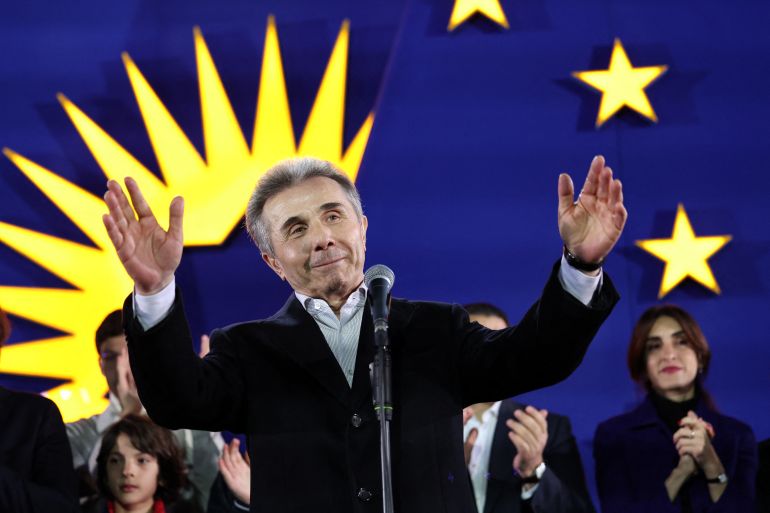Georgia ruling party wins election, says poll body amid opposition protests
Result ensures Georgian Dream’s control of 150-seat parliament, but it is short of an absolute majority to change constitution.
Georgian billionaire and founder of the ruling Georgian Dream party Bidzina Ivanishvili speaks to supporters in Tbilisi [Giorgi Arjevanidze/AFP]Published On 27 Oct 202427 Oct 2024
Georgia’s governing Georgian Dream party has won the country’s parliamentary election, says the electoral commission, amid protests from pro-Western opposition that denounced the vote as a “constitutional coup”.
With more than 99 percent of the precincts counted on Sunday, the governing party received more than 54 percent of the ballot, central election commission chair Giorgi Kalandarishvili told a news conference.
The four opposition parties received more than 37 percent of the vote, with the Coalition for Change receiving the largest slice at 10.822 percent, according to the Georgia Today news website.
Based on preliminary estimates, the Georgian Dream victory ensures it 89 seats in the 150-member parliament – enough to govern but short of the absolute majority it wants to make sweeping constitutional changes.
The results are seen as a blow to pro-Western Georgians, who had cast the election as a choice between a governing party that has deepened ties with Russia, and an opposition that had hoped to fast-track integration with the European Union.
Brussels had warned that Saturday’s vote, seen as a crucial test of democracy in the Caucasus country, would determine the EU candidate’s chances of joining the bloc.
Opposition parties said they did not recognise the outcome of the elections, calling them “fraudulent”.
Tina Bokuchava, leader of the opposition United National Movement (UNM), which campaigned on a pro-European platform, said the results were “falsified” and the election “stolen”.
“This is an attempt to steal Georgia’s future,” she said, declaring that the UNM did not accept the results.
Nika Gvaramia, leader of the Ahali party, called the way the vote was held “a constitutional coup” by the government. “Georgian Dream will not stay in power,” he said.
Pro-opposition Georgian President Salome Zurabishvili also said there had been “deeply troubling incidents of violence” at some polling stations.
One Georgian monitoring organisation called for the results to be annulled, based on reports of voter intimidation and vote buying, but it did not immediately provide evidence of large-scale falsification.
A video circulating on social media also showed a man stuffing a ballot with several papers, while scuffling with election workers. Another clip showed election observers being attacked by unidentified men.
Several local and international monitoring organisations, including the Organisation for Security and Co-operation in Europe (OSCE), are expected to comment on the results later on Sunday.
Demonstrators march during an opposition rally in Tbilisi [Zurab Tsertsvadze/AP]
Georgian Dream’s reclusive billionaire founder Bidzina Ivanishvili, who had campaigned heavily on keeping Georgia out of the war in Ukraine, hailed the result of the vote, with his party putting in its strongest performance since 2012 on the back of huge margins of up to 90 percent in some rural areas.
“It is a rare case in the world that the same party achieves such success in such a difficult situation – this is a good indicator of the talent of the Georgian people,” Ivanishvili told cheering supporters on Saturday night.
Ivanishvili’s Georgian Dream says it wants Georgia to join the EU, though Brussels says the country’s membership application is frozen over what it says is Georgian Dream’s “authoritarian” tendencies.
Its campaign centred on a conspiracy theory about a “global war party” that controls Western institutions and is seeking to drag Georgia into the Russia-Ukraine war. In a country scarred by Russia’s 2008 invasion, the party has sold stories to voters about an imminent threat of war, which the Georgian Dream said it could prevent.
Tamta Kukhaleishvili, a voter, told Al Jazeera that political developments happening in recent years indicate that the country “is moving towards Russia and against democracy”.
“For me, it’s not a country I want to live in,” she said.
